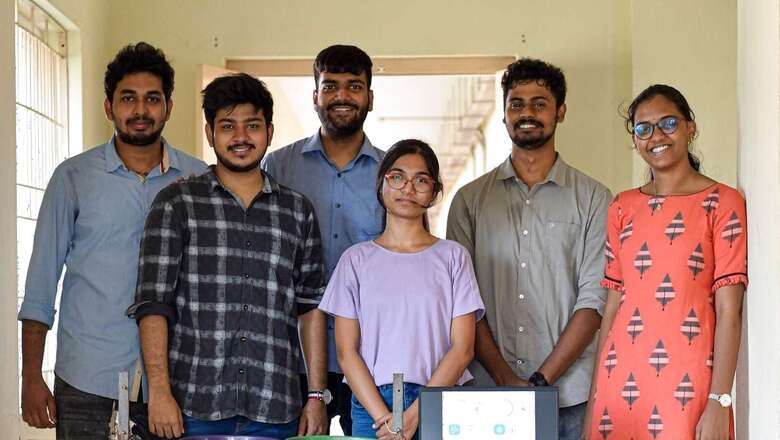
views
Six science and engineering students of GITAM, a deemed-to-be-university, have designed a smart water-recycling system for kitchen sinks to help ease water shortages in India. Relating to the excruciating plight of Chennai’s water crisis in 2019 and determined to give a shot at a solution, they designed an eco-friendly and smart grey-water filtration system called Hydro Gravitricity, which is capable of catalyzing biogas. It recycles the dark grey water coming out of kitchen sinks after dishwashing.
Based on their innovation, the GITAM students have been selected as one of the five teams at the AIM-ICDK Water Innovation Challenge 2.0, organized by the Atal Innovation Mission, NITI Aayog, in partnership with Innovation Center Denmark (ICDK), under the aegis of the Denmark Technical University. The winners will represent India at the International Water Congress to be held in Denmark in May.
The Hydro Gravitricity project is being incubated at the Venture Development Centre of GITAM. The system also won first prize at the Business Plan Contest at Tirutsava, the annual techno-cultural festival of IIT Tirupati.
Five students from the team are pursuing a BTech course at GITAM which includes Anik Panja, Prithvi Tripathy, Sai Sasikanth Rokkam Jeswin GN and Shivani Narsina. The sixth student, Rushali Mishra, is enrolled in second-year BSc (Environmental Science). The team was mentored by GITAM VDC (Venture Development Centre) coaches Vikas Kumar Srivastav and Bollem Raja Kumar.
“The students have designed a self-maintaining, smart, and retrofittable rainwater and greywater filtration system. It has multiple stages fitted with filters, membranes, and sedimentation tanks, with a grease trap. Sand and charcoal filters thoroughly clean the water. Built-in sensors provide real-time data on water quality and parameters such as pH, turbidity, TDS, and water volume,” explained Kumar.
Student Anik Panja, one of the team leaders said, “An average household generates about 356 litres of grey water daily. This is a huge amount if multiplied by millions of restaurants, offices, and households in a city. This water drains into sewers. Recycling it can go a long way in meeting chronic water shortages that plague cities. We built a plug-and-play greywater recycling system that can be retrofitted into existing kitchen pipes with no need for extra plumbing. It is also smart and hassle-free. We have integrated several sensors into the system, allowing it to adjust the self-maintenance cycle and generate a live report for the user to monitor the water usage and output quality.”
It took the students 2.5 years to take the concept to the prototype stage through multiple designs and iterations, Srivastav said. They have been allocated funds and space by GITAM to build and test our prototype, said student Prithvi Tripathy.
“This will be our pilot project. We are now working towards getting access to various water-testing labs in the country to validate the results published by our research. We would like to get access to some water-intensive manufacturing plants to install and test our product,” he added.
The system can be readily implementable in the real-world. “As the system can be retrofitted to existing pipelines, it can be easily scaled up from domestic household to industrial level,” says Sai Sasikanth Rokkam, a member of the student team.
Read all the Latest Education News and Breaking News here




















Comments
0 comment